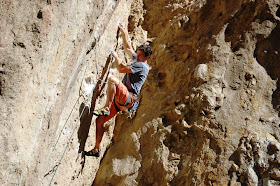Monday, April 16, 2012
Integration Experiment
Today I begin experimentation with a 10-day integration program designed to lead to a short performance peak. I’ve spent most of the last couple of months training indoors and need to transition those strength gains into real world application. Of course it has some foundation because I do this sort of thing all the time but it merits recording because I’m experimenting with a type of taper diet as well.
A little over a week ago I began a 6-day diet designed to cut weight during a low volume period of training without sacrificing any fitness gains. It went okay but wasn’t perfect. I lost 8lbs in a week but performance was sacrificed a bit. This week running a similar template, diet-wise, but beefing it up to accommodate harder training with hopes of nailing what went wrong last time. It didn’t really go wrong. It worked very well in some respects. But my goal is to cut weight and sacrifice no performance so I’m attempting the template under more duress (training load) where nutritional parameters are easier to assess and try and figure how to tweak the original idea.
I begin the week 3lb downs from my high point two weeks ago, so I gained 5 of the 8 I lost back meaning the last attempting promoted too much dehydration or I was indulgent this weekend (it’s a bit of both). Goals are to lose weight while increasing performance comfort outside in three disciplines, running, biking, and climbing.
The details
I chose a 10 day period because the ultimate goal is a perfect tapering diet and you generally taper between one and two weeks for an event. This also coincides with a work trip where I’m supposed to shoot some climbing footage for the P90X2 show and I need to be able to climb whatever routes look good to the production crew.
I will be climbing, running, and riding and training everyday (not doing each daily) as well as doing easy yoga and foam rolling. I’ll be doing three full body postactivation potentiation (PAP) workout per week. These are like a combo of P90X2 Upper and Lower and I’ll post that workout tomorrow.
The diet is low carb for days, around 50% protein with very little fat. While doing this I’ll drink 2 gallons of water a day (yep!) and eat a lot of salt. This, btw, is very difficult for someone who is mainly vegetarian (likely impossible for a vegan) so I’m adding a little bit of meat and fish so that I don’t have to live on protein powder and Shakeology. Hardest thing for me is giving up all the nuts, seeds, and legumes that generally make up most of my diet.
Next I drop the water to one gallon, stop adding salt to food, and add low-glycemic carbs back into the diet. Protein consumption stays high and fat stays low. I normally eat a pretty fatty diet (all healthy plant-based fats from the aforementioned nuts and seeds as well as olives and avocados). This flushes sodium from your body but since I’m not cutting sodium completely it should help cell hydration normalize.
That is only the base template I’m working off of. It’s what I did last time and it’s getting tweaked but I see no reason to post my alterations until I know they work.
The target is increased fat mobilization (as stored glycogen is compromised) and hydration homeostasis. These two things will happen for sure but the trick here is how to do this without a loss in performance. There are many theories on this, of course, but until they’ve been applied with a positive outcome there’s no reason to consider them. My goal is to understand all the subtleties so that I can better advise people on how to do this based on their personal parameters.
yesterday's training; spring conditions on stansbury island.





I have to ask Steve, what is "the P90X2 show"?
ReplyDeleteI haven't asked so I don't really know. Assume it's the infomercial but that's not my department.
ReplyDeleteIf you're doing 50% protein and little carbs what is the other 50%? Just vegetables (since fruits are carbs)? Also, is the 50% in volume or in calories. Thanks?!
ReplyDelete